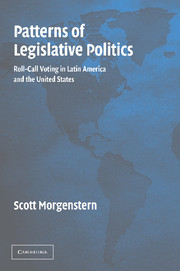Book contents
- Frontmatter
- Contents
- Tables and Figures
- Preface and Acknowledgments
- Party, Faction, and Coalition Names and Abbreviations
- 1 Patterns of Legislative Politics: Identifiability and Flexibility
- 2 Representation and the Agent System
- 3 Identifying Agents
- 4 Influences on Agent Unity: Discipline and Cohesion
- 5 Explaining Voting Unity
- 6 Policy Coalitions and Agent Flexibility
- 7 Conclusion
- Bibliography
- Subject Index
- Author Index
5 - Explaining Voting Unity
Published online by Cambridge University Press: 24 July 2009
- Frontmatter
- Contents
- Tables and Figures
- Preface and Acknowledgments
- Party, Faction, and Coalition Names and Abbreviations
- 1 Patterns of Legislative Politics: Identifiability and Flexibility
- 2 Representation and the Agent System
- 3 Identifying Agents
- 4 Influences on Agent Unity: Discipline and Cohesion
- 5 Explaining Voting Unity
- 6 Policy Coalitions and Agent Flexibility
- 7 Conclusion
- Bibliography
- Subject Index
- Author Index
Summary
Democracy is a function of policy and process. Thus, to continue on their path toward consolidation, governments in Latin America must not only provide economic opportunities and social progress, but also generate these outcomes through a representative, open, and competitive process. The extent to which a country has achieved these procedural goals is particularly evident in the legislature. That is, a legislature's multiple elections, open debates, and competition of ideas among representative groups lay bare the inner workings of a democracy.
Legislators' voting records are key indicators of the patterns of competition. They can help show which groups form coalitions, whether parties are unified or factionalized, and the issues on which groups divide. This chapter tests the theory of agent unity discussed in Chapter 4. That chapter suggested that an agent's unity is a function of both cohesion, which is the result of electoral or ideological affinities, and discipline, which is the power of leaders to enforce voting decisions. The explanation of voting unity thus requires two sets of variables. These variables, in turn, must help to explain two sets of differences: among and within countries.
Electoral systems must play a key role in explaining intercountry variation. This system-level variable structures legislators' incentive systems through its assignment of varying degrees of power to agent leaders over the naming of candidates. When agent leaders have significant power to nominate candidates, the rank-and-file legislators should owe loyalty to the “nominators.”
- Type
- Chapter
- Information
- Patterns of Legislative PoliticsRoll-Call Voting in Latin America and the United States, pp. 115 - 138Publisher: Cambridge University PressPrint publication year: 2003



